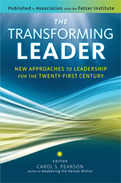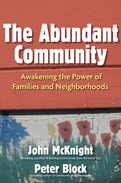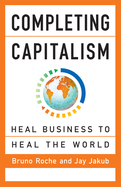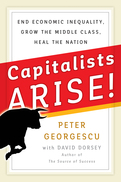Now with 25% new content, including a chapter on building virtual communities.
Healthy communities strive for their members to support one another, share their passions, and achieve personal growth. This book will help you learn to be connected and defeat loneliness by understanding where and how we belong. No matter the kind of organization, company, or social group, this book is a guide for leaders seeking to build a community or strengthen the ones they already have.
Drawing on both 3,000 years of history and his personal experience, Charles Vogl lays out seven time-tested principles for developing connected communities that last. These include:
•Boundary: The boundary between members and outsiders
•Initiation: The activities that mark a new member
•Rituals: The things we do that have meaning
•Temple: A place set aside to find our community
•Stories: What we share that allows others and ourselves to know our values
•Symbols: The things that represent ideas that are important to us
•Inner Rings: A path to growth as we participate
With hands-on tools for applying these principles to any group-formal or informal, mission driven or social, physical or virtual-this book will guide you in your journey to become a community builder that brings people together
Outlines a new leadership approach tailored to the realities of the 21st Century.
No organizational leaders can succeed in today’s fast evolving and highly connected world on their own. To succeed, today’s leaders must not only optimize all their own faculties—mental sharpness, emotional depth, imagination, and creativity—but also utilize the full capacities of those around them in a collaborative and creative manner. The prestigious contributors to this volume draw on psychology, sociology, neuroscience, social networking theory, organizational change theory, myths and traditions, and actual experiences to discover how leaders today achieve transformational results. The Transforming Leader offers an overview of what transformational leadership is, how it works, and how it is evolving. In doing so it reframes the challenge of leading in today’s interdependent, unpredictable world.-
Outlines a new leadership approach tailored to the realities of the twenty-first century
-
Features chapters by such leading authors as Matthew Fox, Diana Whitney, and Alan Briskin
-
Edited and annotated by the author of the bestselling The Hero Within
The traditional model of the heroic leader single-handedly piloting the organization was always something of a myth, but it is especially unrealistic now. We live in a complex, fast-evolving, highly connected world. There is simply too much for a single person to keep track of or to address successfully. Leaders today must not only optimize all their own facultiesmind, body, and spiritthey must harvest the full capacities of those around them.
To discover what leadership models are working now, the prestigious Fetzer Institute, along with the University of Marylands School of Public Policy, and the International Leadership Association, brought together an impressive, interdisciplinary group of scholars and practitioners. The group drew on psychology, sociology, neuroscience, organizational change theory, myths and wisdom traditions, social networking theory, and the actual experiences of successful leaders to discover how leaders today achieve transformational results.
The first part of the book offers an overview of what transformational leadership is, how it works, and how it is evolving. The second part shows readers how to increase cognitive complexity, link up their conscious and unconscious minds, and lead in ways that connect mind, heart, and spirit. The third part describes ways of leading groups to harvest collective wisdom and promote coordinated performance in the service of transformational ends. The conclusion explores how transformational communication can anchor new learnings so that they become habitual.
Overall, The Transforming Leader reframes the challenge of leading in todays interdependent, unpredictable world. Its message is that if we update our thinking, enhance the quality of our being, deepen our sense of relatedness with the ecology of our natural and social worlds, and practice transformational communication, things no longer have to be so hard.
2005
- Presents an original analysis of what the real sources of power are in America today
- Reveals the tactics used by corporate interests to wield hidden power
- Offers detailed strategic advice for how the Democrats can unite with grassroots social movements and form a powerful coalition for fundamental change
- Thom Hartmann, Air America radio host and bestselling author of Screwed, says "Hidden Power is the must-read book of the year. Buy three copies, at least, because you'll want to share a few with friends, and will never want to part with your own well-marked-up copy." read the full review

For the past fifty years, leaders in the business world have believed that their sole responsibility is to maximize profit for shareholders. But this obsessive focus was a major cause of the abuses that nearly sunk the global economy in 2008. In this analytically rigorous and eminently practical book, Bruno Roche and Jay Jakub offer a more complete form of capitalism, one that delivers superior financial performance precisely because it mobilizes and generates human, social, and natural capital along with financial capital. They describe how the model has been implemented in live business pilots in Africa, Asia, and elsewhere. Recent high-profile books like Capital in the Twenty-First Century have exposed financial capitalism's shortcomings, but this book goes far beyond by describing a well-developed, field-tested alternative.
2017
Marshaling deeply sobering statistics, Georgescu depicts the stark reality of America today: a nation with greater wealth inequality and lower social mobility than just about any other country in the developed world. But the problem isn't that free-market capitalism no longer works—it's that it's been hijacked by shareholder primacy. Where once our business leaders looked to the needs and interests of a variety of stakeholders—employees, community members, the business itself—now they're myopically focused on maximizing their shareholders' quarterly returns.
Capitalists, Arise! shows how the short-term thinking spawned by shareholder primacy lies at the root of our current economic malaise and social breakdown. But Georgescu offers concrete actions that capitalists themselves can take to create a better future. The irony is that if businesses do this, shareholders will do even better. In the long run, businesses can thrive only when society is healthy and strong. This book is a manifesto calling on capitalists to heal the nation that has given them so much.















